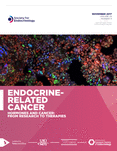Current mouse and cell models in prostate cancer research
- 1Department of Pathology, New York University School of Medicine, New York, NY, USA
2Arthritis and Tissue Degeneration Program, Hospital for Special Surgery, New York, NY, USA
3Laboratory of Molecular Biology, the Rockefeller University, New York, NY, USA
4Department of Pathology, University of Southern California Keck School of Medicine, Los Angeles, CA, USA
5Department of Urology, New York University School of Medicine, New York, NY, USA
6NYU Cancer Institute, New York University School of Medicine, New York, NY, USA
7New York Harbor Healthcare System, New York, NY, USA
8Department of Urology, Innsbruck Medical University, Innsbruck, Austria
- Correspondence should be addressed to P Lee or Z Culig; Emails: peng.lee{at}nyumc.org; zoran.culig{at}i-med.ac.at
Abstract
Mouse models of prostate cancer (PCa) are critical for understanding the biology of PCa initiation, progression, and treatment modalities. Here, we summarize recent advances in PCa mouse models that led to new insights into specific gene functions in PCa. For example, the study of transgenic mice with TMPRSS2/ERG, an androgen-regulated fusion protein, revealed its role in developing PCa precursor lesions, prostate intraepithelial neoplasia; however, it is not sufficient for PCa development. Double deficiency of Pten and Smad4 leads to a high incidence of metastatic PCa. Targeted deletion of Pten in castration-resistant Nkx3-1-expressing cells results in rapid carcinoma formation after androgen-mediated regeneration, indicating that progenitor cells with luminal characteristics can play a role in initiation of PCa. Transgenic mice with activated oncogenes, growth factors, and steroid hormone receptors or inactivated tumor suppressors continue to provide insights into disease progression from initiation to metastasis. Further development of new PCa models with spatial and temporal regulation of candidate gene expression will probably enhance our understanding of the complex events that lead to PCa initiation and progression, thereby invoking novel strategies to combat this common disease in men.
- Revision received 18 March 2013
- Accepted 11 April 2013
- Made available online as an Accepted Preprint 11 April 2013
- © 2013 Society for Endocrinology












